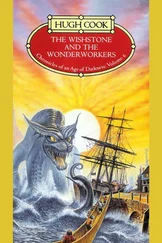Hugh Cook - The Wicked and the Witless
Здесь есть возможность читать онлайн «Hugh Cook - The Wicked and the Witless» весь текст электронной книги совершенно бесплатно (целиком полную версию без сокращений). В некоторых случаях можно слушать аудио, скачать через торрент в формате fb2 и присутствует краткое содержание. Жанр: Фэнтези, на английском языке. Описание произведения, (предисловие) а так же отзывы посетителей доступны на портале библиотеки ЛибКат.
- Название:The Wicked and the Witless
- Автор:
- Жанр:
- Год:неизвестен
- ISBN:нет данных
- Рейтинг книги:3 / 5. Голосов: 1
-
Избранное:Добавить в избранное
- Отзывы:
-
Ваша оценка:
- 60
- 1
- 2
- 3
- 4
- 5
The Wicked and the Witless: краткое содержание, описание и аннотация
Предлагаем к чтению аннотацию, описание, краткое содержание или предисловие (зависит от того, что написал сам автор книги «The Wicked and the Witless»). Если вы не нашли необходимую информацию о книге — напишите в комментариях, мы постараемся отыскать её.
The Wicked and the Witless — читать онлайн бесплатно полную книгу (весь текст) целиком
Ниже представлен текст книги, разбитый по страницам. Система сохранения места последней прочитанной страницы, позволяет с удобством читать онлайн бесплатно книгу «The Wicked and the Witless», без необходимости каждый раз заново искать на чём Вы остановились. Поставьте закладку, и сможете в любой момент перейти на страницу, на которой закончили чтение.
Интервал:
Закладка:
Then said no more, for he was suppressed. Judge Qolidian smiled grimly as the suppression proceeded. Then, seeing things were getting out of hand, he said:
'All right, all right, that's enough! You can take your boot off his throat.'
Sarazin, somewhat the worse for wear, was restored to his proper place in the dock. Then Judge Qolidian smiled again. Then laughed with manic glee. Then coughed, and brought himself under control. Then said:
'Sean Kelebes Sarazin, I sentence you to be taken to a place of imprisonment and there to be held until Mid- summer's Day.'
Sarazin looked up, startled. Was that all? Imprisonment till Midsummer's Day? That was nothing! However, the judge was not finished yet…
'On Midsummer's Day you are to be taken to the westernmost part of Unkrana. There you are to be hung from the neck until near dead. Then you are to be dragged through the streets to Libernek Square, there to have your intestines torn from your body, after which your body itself is to be cleaved into quarters.' Sarazin smiled, faintly. He did not believe it.
He did not believe it until the following night, when he woke from nightmare. Screaming.
Long he lay in the darkness, sweating, shivering, near dead from dread. Then, towards dawn, he remembered. Of course! The kingmaker could exercise the prerogative of mercy. That, like the power to appoint city and regional governors, was one of the kingmaker's inalienable powers.
'My mother will save me,' said Sarazin. 'She will. She must!
Seeking Farfalla's mercy, Sarazin drafted an appeal himself at dawn and had it sent to her. After thirty days a reply came from Farfalla's personal secretary:
The kingmaker Farfalla, mother of all the peoples, ruler of the See of the Sun, instructs me to advise you that your petition for clemency has been rejected.'
And Sarazin reacted first with anger, then hate, then grief.
The days dragged by until, in due course, Sarazin learnt that the judge who had sentenced him had been appointed governor of Androlmarphos. Judge Qolidian had con- demned Sarazin to suffer a dreadful death. And Farfalla had shown her gratitude by making him a king.
Sarazin screamed in rage, screamed and screamed and battered the door of his cell with his fists. Which did him no good, of course. Shortly his lawyer, Childermas Imbleprig, came to say they would be appealing against his sentence. But Sarazin, no longer believing anything could help him, lapsed into a deep depression.
Even when he was brought into court on the occasion of his appeal – which was heard before the eminent Judge Syrphus – he was still too depressed to take much cognisance of the proceedings. After outlining the course of Sarazin's trial and detailing the sentence, Childermass Imbleprig (having thus earnt sufficient sanarands to temporarily quell his loquacity) finally got to the meat of the matter.
The defence, my lord,' said he, 'asks the court to lay aside the sentence on the grounds that it was improper.'
'Wherefore is it improper?' said Judge Syrphus. To hang, draw and quarter a man is a perfectly respectable procedure.'
With all respect, my lord,' said Imbleprig, 'the proper form of the sentence requires that the prisoner's intestines be burnt in his sight while he is still living. This was omitted from the sentence. I have notarised transcripts of the trial with me if you wish to see them.' His lordship scrutinised the relevant documents.
TDear me,' he said. 'Dear dear! Dear dear dear me! You're quite right! The judge of the case entirely failed to make mention of the burning of intestines.' Days of legal argument followed.
The prosecution claimed the sentence must stand, since it was 'contrary to reason for a prisoner still to be alive while his intestines are burnt'.
But Imbleprig cited the notorious case of Brute Dargzon, who, 'after his intestines were torn out, had strength enough to rise from the ground, pick up a piece of his own lower bowel then hit the executioner in the face with it.'
Furthermore, continued Imbleprig, it was well known that the Orfus pirates would often nail a section of a man's bowels to a mast then chase that victim with red-hot irons, causing him to unravel his own intestines.
'A disembowelled man, then,' said Imbleprig, 'is not a dead man, so the prescribed form of execution for high treason is not, despite the prosecution's claims, absurd. Besides, even if it were absurd, that would be beside the point. The rule of law requires the letter of the law to be followed in all things, and, as the wise have often remarked, if the law were cleansed of patent absurdities there would be little of it left at all, and precious little work for lawyers.
The defence, then, has an unassailable argument. The law allows only one form of punishment for the crime of High Treason and that form prescribes the burning of the prisoner's bowels in the prisoner's presence as a compulsory part of the ritual.
'If the defective sentence handed down by Judge Qolidian were to be carried out then a miscarriage of justice would have taken place. For, if Sean Kelebes Sarazin were executed without seeing his own guts thrown on a bonfire, then he would be the victim of an entirely unlawful and unprecedented sentence.
Therefore, since the sentence was improper, the defence asks the court to lay aside that sentence.'
Judge Syrphus reserved his decision, and three days of tension followed. Then the learned judge presented his judgment, which took half a day to deliver. Sarazin understood none of it for Syrphus spoke in Legal Churl, which is more difficult than Field Churl, City Churl and High Churl all rolled into one.
Finally, his business done, the judge took his leave and all those in the court began to disperse.
'Come on,' said Imbleprig, taking Sarazin by the arm. 'Let's take you home.' We… we won?' said Sarazin, scarcely daring to believe. 'Of course we won! You heard the judgment yourself.'
Indeed, they had won. The judge had ruled that the sentence imposed on Sean Sarazin by Judge Qolidian was defective, hence was illegal. The law allowed only one way for such situations to be rectified: the prisoner must be allowed to walk free. However, in practice it did not prove that simple.
While Judge Syrphus had been delivering his verdict a mob had been gathering outside his courtroom. A hundred men of the Watch, commanded by Thodric Jarl, were on hand to help convey Sean Sarazin to his mother's palace. But they had a struggle for the mob shouted, roared and threw things. It was terrifying!
Sarazin was almost crushed to death in the press. It was as bad as his first day in Selzirk, when he had almost died in a mob-trample in the confines of Kesh.
At last, Jarl and his stalwarts brought Sarazin safe into Farfalla's palace, and the gates were closed against the mob. Which promptly began to storm the palace.
Since Farfalla's palace was a converted wizard-built castle, and since the original moat of flame which had ringed that castle still existed, it had the potential to be a formidable fortress. However, its defences had been compromised (in the interests of convenience) by a number of bridges which arched to the battlements from four- storey towers built without the flame moat.
Farfalla's few guards could not defend so many ap- proaches against enemies in strength.
Sean Sarazin – shocked, dazed, bewildered and appalled by the hatred of the mob – was bustled through the palace and up the many stairs to Farfalla's throne room. High was that throne room, so high that it overlooked the four-storey battlements of the palace and afforded a view of Selzirk and the lands of the Harvest Plains beyond the city.
The throne room was packed already with hysterical serving girls, wounded guards and assorted riff-raff. Out of the press came Sarazin's mother who assaulted Sarazin before he could even think of defending himself.
Читать дальшеИнтервал:
Закладка:
Похожие книги на «The Wicked and the Witless»
Представляем Вашему вниманию похожие книги на «The Wicked and the Witless» списком для выбора. Мы отобрали схожую по названию и смыслу литературу в надежде предоставить читателям больше вариантов отыскать новые, интересные, ещё непрочитанные произведения.
Обсуждение, отзывы о книге «The Wicked and the Witless» и просто собственные мнения читателей. Оставьте ваши комментарии, напишите, что Вы думаете о произведении, его смысле или главных героях. Укажите что конкретно понравилось, а что нет, и почему Вы так считаете.












